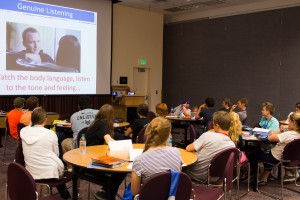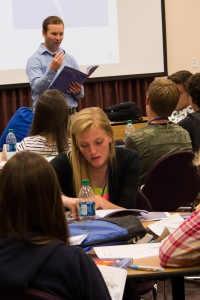
Stephen R. Covey’s 1989 self-help book, “The Seven Habits of Highly Effective People,” maintains its influence in 2014. BYU’s new Habits for Life youth camp, which revolves around the principles taught in Covey’s book, just finished its first-ever session on June 7, 2014.
Habits for Life is one of three new camp options for youth ages 14–18 that BYU is offering this year, along with an ACT and mission prep camps.
This camp has a different aim than EFY, which focuses largely on gospel principles. Habits for Life deals more specifically with developing skills like goal setting and achieving and improving relationships with others. Ben Knowlton, an Institute teacher at the Orem Institute of Religion, helped design the program’s content based on the idea of building competency.
“There’s this quote that I like; it’s, ‘To be faithful is good, but to be faithful and competent is better,’” Knowlton said. “We feel like EFY and other youth camps do a great job with the faithful part, which is necessary, but we like the competent angle.”
The camp is structured similarly to EFY: a group of teenagers are assigned a counselor who guides them around and helps them apply the principles learned in their workshops. The counselors’ most important responsibility is to meet with the participants in their groups for an hour in the morning and night to discuss personal stories about the effects of living the habits.
“I think my dorm counselor is the most integral employee in the entire program,” said Sharon Meyers, a BYU program administrator for conferences and workshops. “The qualifications to even apply was you had to have a personal knowledge of the habits and experience living them.”

Meyers meticulously examines counselor applicants before hiring them. She hired Malia Brady, a sophomore from Mapleton, even though Brady already had a full-time summer job. Brady arranged to be temporarily terminated from her job to work for the camp during its three sessions. She hasn’t regretted her decision as she gets to work with “intelligent and high-achieving” teenagers.
“They’re coming definitely to learn,” Brady said. “My experience in EFY was a really social experience where I was going to build my testimony and also have that social experience, but I feel like the kids here … have that desire to learn these principles. I thought that was really interesting when I was first introduced to them.”
Meyers encouraged participants to submit anonymous feedback each night to make changes to future sessions. Meyers’ personal favorite piece of feedback reads, “I love how the camp involves the light of Christ but doesn’t shove it down our throats.”
One camp participant, Katie Jennings, a recent high school graduate from Los Alamos, New Mexico, heard about the camp from her dad. She thought the camp would benefit her in reaching her goal of becoming a culinary artist.
“Everyone knows how to set goals. You say you’re gonna do something, you work towards it, but working towards it sometimes isn’t as easy as it seems,” Jennings said. “With this program it teaches you how to do that … in manageable sizes.”
The idea to start the new camp began in 2013 when a high school in Taiwan contacted BYU, wanting a leadership program to be developed for its students during their two-week stay with host families.
“The last thing I wanted to do was start from scratch,” Meyers said. “So I just immediately thought of ‘Seven Habits,’ and at that time I didn’t realize there was a teen curriculum available.”
During the Taiwanese students’ stay last June, they participated in BYU’s newly developed, week-long “Taiwan Youth Leadership Program.” They stayed on campus from 9 a.m. to 5 p.m. before returning to stay at their host family’s houses.
“We did our first trial run last June with Taiwanese students … and the feedback so far exceeded our expectations,” Meyers said. “It just seemed instantly we knew this should be a youth camp.”
The camp participants use Covey’s “Seven Habits” book as a workbook, and all camp instructors have to receive certification from the FranklinCovey company before teaching the workshops.
The Habits for Life camp is set up in smaller groups than EFY’s to facilitate participation and the chance to get to know group members better. Camp participants stay in Heritage Halls, and with the exception of eating in the Cannon Center, all events take place in the BYU Conference Center.
While each session of the camp will not include more than 250 to 300 participants, Meyers expects the camp to grow by adding additional sessions and eventually leaving campus.




